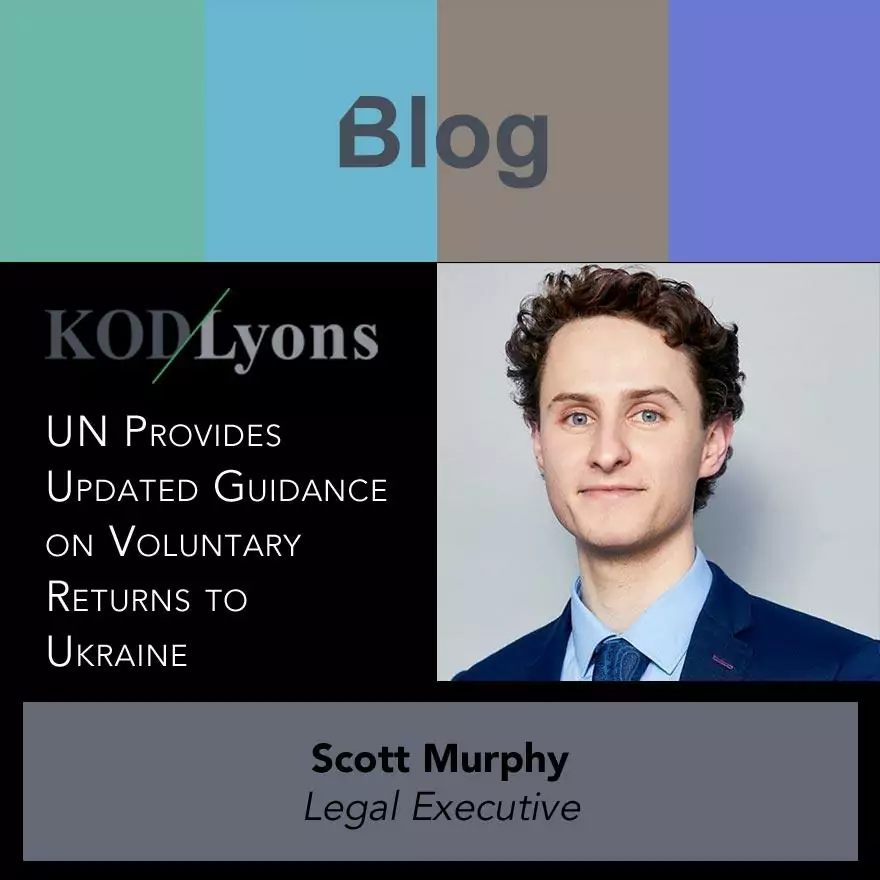The United Nations High Commissioner for Refugees (UNHCR) has released updated guidance on voluntary returns to Ukraine. The update will further assist Ukrainian refugees, internally displaced persons (IDPs) within Ukraine, and host States such as Ireland approach the issue of people wanting to return home to Ukraine in the long and short-term.
Ukrainian Refugees and IDPs
The majority of people displaced from Ukraine require international protection. According to the UN’s Humanitarian Response Plan, 17.6 million people, particularly those in eastern Ukraine, require humanitarian assistance. Despite this, the vast majority of Ukrainian refugees intend to return home to Ukraine permanently. Research conducted by the UNHCR found that 76 per cent of Ukrainian refugees and 82 per cent of internally displaced Ukrainians intend to return home permanently one day. However, only 15 per cent of Ukrainian refugees and IDPs interviewed by the UN in this study planned to do so in the next three months.
Voluntary Returns to Ukraine
The UNHCR describes voluntary return as a fundamental right of Ukrainian refugees. 39% of Ukrainian refugees interviewed in the UN’s study said that a member of their family made at least one short-term visit to their home area of Ukraine since they were forced to flee. The UN’s guidance makes clear that the ability of Ukrainian refugees to return for short periods to Ukraine can make long-term returns more feasible. The UN emphasises that host States, returning refugees and Ukrainian authorities will need to work together to make long-term returns feasible and safe. This includes work such as demining, repairing houses and rebuilding infrastructure. The UN also emphasises that the ability of Ukrainian refugees to return for short periods does not undermine their ongoing need for international protection.
Safeguards and Considerations in Voluntary Returns
In its most recent guidance, the UN has reiterated its previous position that States should not forcibly return Ukrainian nationals and people who previously lived in Ukraine to the country. Rather, host States must continue to ensure the safety, inclusion, and protection of Ukrainian refugees. Negative push factors, including a lack of access to accommodation, public services, and the labour market, may incentivize Ukrainian refugees to return to Ukraine prematurely. Push factors can also negate the voluntary nature of returns to Ukraine which should only be done when fully informed and voluntary. While plans are already underway to develop alternative stay arrangements for Ukrainian refugees beyond temporary protection arrangements, the ongoing inclusion of Ukrainian refugees must be a priority for host States.
Should you have any questions or queries arising from this blogpost or for other immigration queries, please do not hesitate to contact Stephen Kirwan of this office at stephen.kirwan@kodlyons.ie.
Get in touch
Leaders in our field and winners at the Irish Law awards we have proven expertise in immigration and international law, child and family law and personal injury litigation.
Tel: +353 1 679 0780
Email: info@kodlyons.ie








